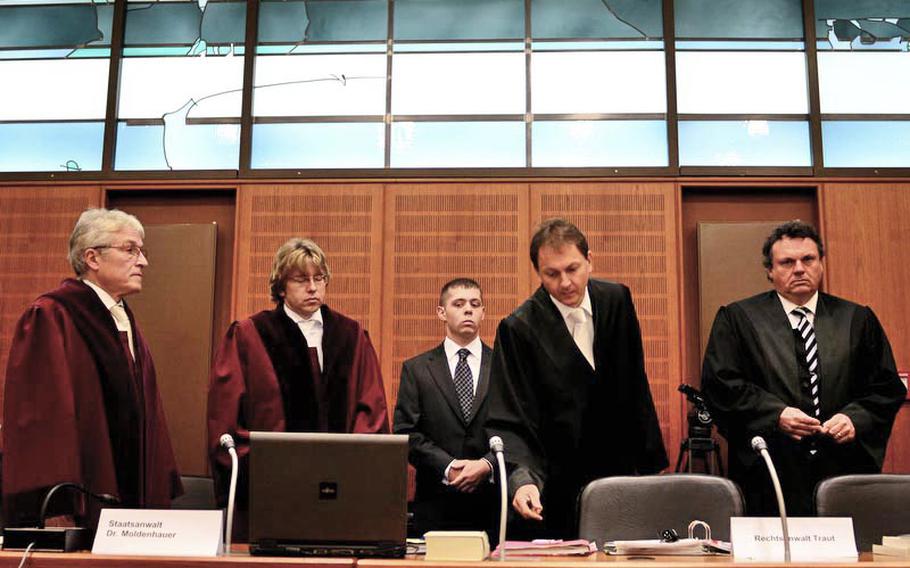Europe
Prosecutor: Uka turned bus into ‘deadly tunnel’
Stars and Stripes January 9, 2012

German prosecutors filed the most severe murder charge against Arid Uka, who has admitted to killing two U.S. airmen and trying to kill three more at the Frankfurt International Airport on March 2. Pictured from left are two prosecutors (in red robes), Air Force Staff Sgt. Trevor Brewer, who testified Uka tried to shoot him twice, Marcus Traut, the lawyer representing Brewer and the two wounded airmen, and Marcus Steffel, representing the families of the dead airmen. (Joshua L. DeMotts/Stars and Stripes file)
This report was updated Jan. 9, 2012, at 9:40 a.m. EST
FRANKFURT, Germany — The man charged with killing two U.S. airmen and wounding two others in what prosecutors called a “personal jihad” should receive Germany’s harshest sentence of life in prison, prosecutors urged Monday in closing arguments at a Frankfurt court.Arid Uka, 21, should not be eligible for parole for some time after he’s served the minimum 15 years, prosecutors said. A murder conviction in Germany carries a life sentence, with parole eligibility at 15 years. Germany does not sentence people to death, nor does it impose life sentences without possible parole. Findings of “severe guilt” would extend the time before parole was possible, perhaps by five years, German legal experts have said.Uka, a Kosovo Albanian confessed to the March 2 shooting at Frankfurt Airport during his first court date in August. He committed the murders after lying in wait, prosecutor Jochen Weingarten told the three professional judges deciding the case. Uka shot Senior Airman Nicholas Alden, 25, of Williamston, S.C., in the head as he stood outside a bus bound for Ramstein Air Base en route to a deployment in Afghanistan, according to trial testimony. Uka then boarded the bus and shot the driver, Airman 1st Class Zachary Cuddeback, 21, of Stanardsville, Va., in the temple. Both Alden and Cuddeback died.Once aboard, Uka turned the bus into “a deadly tunnel,” the prosecutor said, without means of escape so that he could “liquidate them, soldier by soldier.”Uka continued to fire, witnesses testified during his trial, wounding Staff Sgt. Kristoffer Schneider, 25, of Irwin, Pa., and Senior Airman Edgar Veguilla, from Wichita Falls, Texas. A third attempted murder count involved Staff Sgt. Trevor Brewer, 23, who testified that Uka had shot twice at him but the gun had jammed both times. Uka’s defense conceded that he should get a life sentence, but said he should be eligible for parole after 15 years because of his youth and immaturity. “He’s not a man. He’s a boy who spent his time playing computer games,” said defense attorney Michaela Roth.Roth said that the shootings were not religiously motivated but had happened because Uka wanted to protect helpless Afghan victims from being raped by American soldiers. Roth said Uka, who had been sexually molested with he was 6 years old by a man, had been in part driven to the shootings after watching a clip of the movie “Redacted” showing the rape by U.S. soldiers of an Iraqi girl and the murders of her and her family.“It brought the feelings back --- feelings of shame, helplessness and despair,” Roth said.Two lawyers for the families of the dead and injured also made arguments and agreed with the prosecutors.Schneider, who was blinded in the attack and still suffers from numerous neurological maladies, wrote to the court that his wife and children had been traumatized by his injuries and continuing worries that he might die.“I want justice for myself, my brothers and my team,” Schneider wrote.Marcus Traut, the German lawyer who has represented Schneider and the other wounded airmen at the trial, told the judges Uka had learned little from the tragedy he caused.“What does Arid Uka do? He shoots half my client’s head away,” Traut said. “But he still wants to play violent computer games in prison. He understands nothing.”Uka, who in testimony was described as a quiet student, a good employee and who had no criminal record, spent the four hours of the hearing looking down at the table as he has throughout the trial.In a letter he wrote to the court Monday, Cuddeback’s father, Robert, wrote, “This brutal, cowardly act of terrorism, clothed in religious extremism was a well-planned, premeditated act. … Mr. Uka cowardly attacked 16 unarmed United States Airmen and changed their life, and that of family and friends, forever.”Robert Cuddeback has said he wanted Uka to be brought to the U.S. for trial where he would likely face harsher sentencing. In June, U.S. federal prosecutors filed murder and terrorism-related charges against Uka in federal district court in Manhattan. Officials have declined to say whether they were seeking Uka’s extradition.In his impact statement, Robert Cuddeback indicated extradition had been sought and denied, and he asked the German government to reconsider.“Mr. Uka’s actions against the United States warrant a United States trial,” he wrote.
A spokeswoman from the German Justice Ministry said Monday that German and American authorities are in contact regarding Uka’s possible extradition, but there has been no final decision. However, she said German law does not allow for someone to be punished twice, so if Uka is sentenced in Germany, he would not be extradited. James Alden told the court that his son, born in Germany to military parents, had become a military police officer to help people and had wanted “to help the people and the children” in Afghanistan. “He had many, many, many great qualities. One of his greatest was his gentleness and his wanting to serve the public.“Our family is devastated; we are torn up,” Alden said in a raspy voice.The trial concludes Jan. 19, when the judges are to give their judgment and sentencing. montgomeryn@estripes.osd.milabramsm@estripes.osd.mil